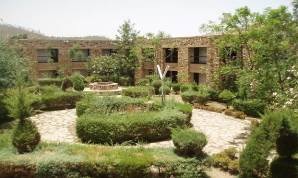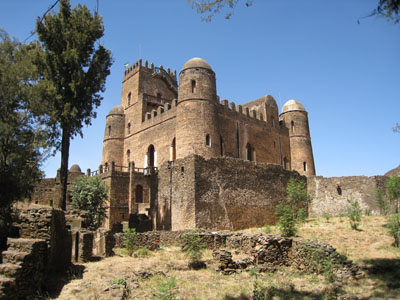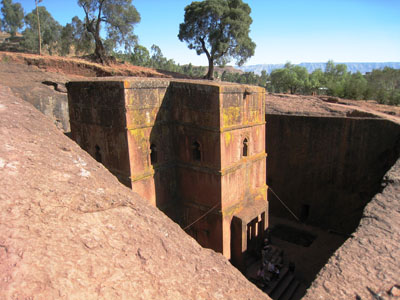Axum
 The hand of nature in the form of heavy downpours of rain, seems to take the place of systematic excavations, to bring to light some of the long-buried hordes of gold, silver and bronze coins.
The hand of nature in the form of heavy downpours of rain, seems to take the place of systematic excavations, to bring to light some of the long-buried hordes of gold, silver and bronze coins.
Was There a pre-Axum civilization of Ethiopia ?
Yeha: The tantalizing and towering ruins of Yeha's Temple of the Moon - built more than 2,500 years ago, in Sabaean times, is considered to be Ethiopia's earliest high civilization.
Whether this was a lone shrine of a temple , or part of a city with other similar edifices is not yet ascertained.
Nevertheless, the fact that the wall is built with precise-fitting blocks of smoothly polished yellow limestone carefully placed without the use of mortar, leaves no doubt of the superb quality and craftsmanship involved.
Apart from the temple, however - which speaks eloquently of the works of a high civilization - little or nothing is known about the people who built this great edifice. This mystery also raises another mystery: how far back does Ethiopian civilization really go?
Although inscriptions and fine objects of bronze and other artifacts have been excavated from Yeha since 1909, nothing is uncovered to shade light on the above mysteries.
The Axumite Kingdom
Axum, was a great commercial civilization trading with distant lands, such as Egypt, Arabia, Persia, India, Ceylon, etc. Its main exports were gold, ivory, rhinoceros-horn, hippopotamus hide and slaves. It imported mainly textiles, finished metal wares, and metals to be used for the manufacturing of local crafts.
Pre-Christianity Axum
The stelea erected in Axum seem less like pillars of stone and more like lightning rods to heaven. The purpose of these prodigious monolithic stelea may have been to draw down power from the firmament in a ritual, undoubtedly accompanied by occasional sacrifices. Most of the obelisks have altars at their bases, all aligned towards the rising sun. Four deep holes in the center of one were presumably made to collect blood from the sacrifices.
Like many other monolithic Ethiopian works, it is carved to resemble a conventional building - in this case a nine-story tower-house.
Of the three tallest stelea, one is still standing, another is lying broken into pieces, but otherwise intact, and the third is being returned to its rightful place from Rome, where it has been standing ever since the Italian Invasion of Ethiopia during the second World War.
Post Christianity Axum
Axum still holds a significant place among the members of the Ethiopian Orthodox Church, because of the Cathedral of St. Mary of Zion.
This church was built on the site of a much older church, probably resembling that of Debre Damo, dating from the 4th century AD. Only a platform and the wide stone steps remain from the earlier structure. The Cathedral is the repository of the crowns of some of Ethiopia's former emperors, and is believed to house the original Ark of the Covenant - thus making St. Mary the holiest sanctuary in Ethiopia.
The significance of Monasticism in the Ethioipian Coptic Church
Debre Damo, uniquely enough, offers that broader horizon of the Ethiopian spiritual entity, and the significant place monasticism holds in the Ethiopian Coptic Church.
As is the case with some Ethiopian monasteries, and mainly for religious reasons, women do not have the access to visit this site.
The monastery is found on a cliff 24 meters high that makes the entrance an event by itself. Monks lower a safety rope to be tied around the waist and to climb with.
This lack of access, may have preserved the art treasures of Debra Damo all through out its 1400 years history.
The treasures include an extensive collection of illuminated manuscripts, some of them not found anywhere else in Ethiopia, and intricate carvings on the beams and ceiling of the ancient church around which the monastery is built. There are also large number of paintings including several that depict the legend of the foundation of Debra Damo by Abuna Aragawi.
The monastic community is virtually self- sufficient, growing selected crops and rearing sheep and goats for their milk and meat. The monastery also has its own reservoirs, spectacular caverns hewn deep beneath the surface of the cliff-top centuries ago, somewhat similar to those at the rock-hewn churches of Lalibela.
Modern Tigray
Although Axum was the dominant power of the past, power shifted to the town of Mekele, when it became the capital of Emperor Yohannes IV (1871 - 1889). It is also the present main city of Tigray, and perhaps the fastest growing city in Ethiopia these days.
The Emperor's palace has been turned into a particularly interesting museum, with many exhibits of his time and subsequent historical remains.
The city is also well known as a transit point for the Camel Caravans that bring up salt from the arid lands of the Danakil Depression. This makes the market place an interesting sight to visit.
Intrepid visitors can also make excursions into the Danakil to visit some of the Afar nomads that trek across the region.
Intrepid visitors can also make excursions into the Danakil to visit some of the Afar nomads that trek across the region. However, please refer to the Adventure Tours: Danakil Depression page before doing so.
 Sabean hotel is a new 5 story building hotel in Axum. It is the best hotel in Axum in terms of accommodation and meal service. Rooms are spacious with in suite bath room. All floors are accessible either by stairs or suing a dedicated elevator. The restaurant serves both traditional and international dishes.
Sabean hotel is a new 5 story building hotel in Axum. It is the best hotel in Axum in terms of accommodation and meal service. Rooms are spacious with in suite bath room. All floors are accessible either by stairs or suing a dedicated elevator. The restaurant serves both traditional and international dishes.
www.sabeanhotel.com
 Yared Zema International Hotel offers Suite rooms, Single rooms and Twin bed rooms, bar, Steam & Jacuzzi, traditional and European dishes in our restaurant, meeting hall, Bar, and so much more. It is one of the best Hotel Axum offers.
Yared Zema International Hotel offers Suite rooms, Single rooms and Twin bed rooms, bar, Steam & Jacuzzi, traditional and European dishes in our restaurant, meeting hall, Bar, and so much more. It is one of the best Hotel Axum offers.
http://site.yaredzemainternationalhotel.com/
 The Yeha Hotel occupies an advantageous location overlooking the impressive stele or obelisks, and the Queen of Sheba's bath, a huge water reservoir, hewn out of solid rock, which forms the focal point of the annual ceremony of Timkat (Epiphany). Opened in 1994, this three star local hotel offers 62 simple rooms and suites equipped with private bathrooms and decorated in colourful local style. There is also a restaurant and a terrace bar with great views. This is the best option is a town where accommodation options are extremely limited.
The Yeha Hotel occupies an advantageous location overlooking the impressive stele or obelisks, and the Queen of Sheba's bath, a huge water reservoir, hewn out of solid rock, which forms the focal point of the annual ceremony of Timkat (Epiphany). Opened in 1994, this three star local hotel offers 62 simple rooms and suites equipped with private bathrooms and decorated in colourful local style. There is also a restaurant and a terrace bar with great views. This is the best option is a town where accommodation options are extremely limited.
www.ghionhotel.com.et/yeha.htm











